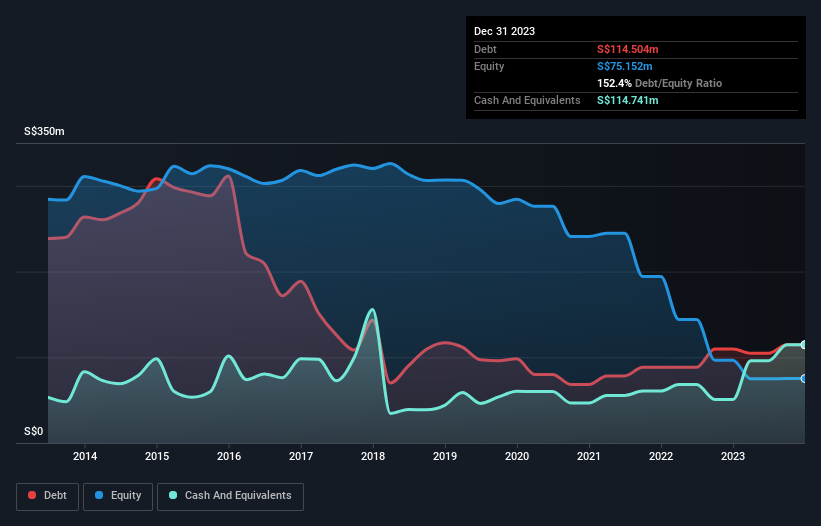Warren Buffett famously said, 'Volatility is far from synonymous with risk.' So it might be obvious that you need to consider debt, when you think about how risky any given stock is, because too much debt can sink a company. We note that Tiong Seng Holdings Limited (SGX:BFI) does have debt on its balance sheet. But the more important question is: how much risk is that debt creating?
Why Does Debt Bring Risk?
Debt and other liabilities become risky for a business when it cannot easily fulfill those obligations, either with free cash flow or by raising capital at an attractive price. In the worst case scenario, a company can go bankrupt if it cannot pay its creditors. While that is not too common, we often do see indebted companies permanently diluting shareholders because lenders force them to raise capital at a distressed price. Of course, the upside of debt is that it often represents cheap capital, especially when it replaces dilution in a company with the ability to reinvest at high rates of return. The first thing to do when considering how much debt a business uses is to look at its cash and debt together.
See our latest analysis for Tiong Seng Holdings
What Is Tiong Seng Holdings's Net Debt?
The image below, which you can click on for greater detail, shows that at December 2023 Tiong Seng Holdings had debt of S$114.5m, up from S$109.6m in one year. However, its balance sheet shows it holds S$114.7m in cash, so it actually has S$237.0k net cash.

How Healthy Is Tiong Seng Holdings' Balance Sheet?
The latest balance sheet data shows that Tiong Seng Holdings had liabilities of S$404.1m due within a year, and liabilities of S$34.8m falling due after that. Offsetting this, it had S$114.7m in cash and S$113.5m in receivables that were due within 12 months. So its liabilities total S$210.6m more than the combination of its cash and short-term receivables.
The deficiency here weighs heavily on the S$32.2m company itself, as if a child were struggling under the weight of an enormous back-pack full of books, his sports gear, and a trumpet. So we definitely think shareholders need to watch this one closely. After all, Tiong Seng Holdings would likely require a major re-capitalisation if it had to pay its creditors today. Given that Tiong Seng Holdings has more cash than debt, we're pretty confident it can handle its debt, despite the fact that it has a lot of liabilities in total. When analysing debt levels, the balance sheet is the obvious place to start. But it is Tiong Seng Holdings's earnings that will influence how the balance sheet holds up in the future. So when considering debt, it's definitely worth looking at the earnings trend. Click here for an interactive snapshot.
In the last year Tiong Seng Holdings wasn't profitable at an EBIT level, but managed to grow its revenue by 34%, to S$477m. Shareholders probably have their fingers crossed that it can grow its way to profits.
So How Risky Is Tiong Seng Holdings?
Although Tiong Seng Holdings had an earnings before interest and tax (EBIT) loss over the last twelve months, it generated positive free cash flow of S$43m. So although it is loss-making, it doesn't seem to have too much near-term balance sheet risk, keeping in mind the net cash. The saving grace for the stock is the strong revenue growth of 34% over the last twelve months. But the stock still looks risky to us. There's no doubt that we learn most about debt from the balance sheet. However, not all investment risk resides within the balance sheet - far from it. For example, we've discovered 2 warning signs for Tiong Seng Holdings (1 is concerning!) that you should be aware of before investing here.
If you're interested in investing in businesses that can grow profits without the burden of debt, then check out this free list of growing businesses that have net cash on the balance sheet.
Valuation is complex, but we're here to simplify it.
Discover if Tiong Seng Holdings might be undervalued or overvalued with our detailed analysis, featuring fair value estimates, potential risks, dividends, insider trades, and its financial condition.
Access Free AnalysisHave feedback on this article? Concerned about the content? Get in touch with us directly. Alternatively, email editorial-team (at) simplywallst.com.
This article by Simply Wall St is general in nature. We provide commentary based on historical data and analyst forecasts only using an unbiased methodology and our articles are not intended to be financial advice. It does not constitute a recommendation to buy or sell any stock, and does not take account of your objectives, or your financial situation. We aim to bring you long-term focused analysis driven by fundamental data. Note that our analysis may not factor in the latest price-sensitive company announcements or qualitative material. Simply Wall St has no position in any stocks mentioned.
About SGX:BFI
Tiong Seng Holdings
Provides building construction and civil engineering services in Singapore, the People’s Republic of China, and Malaysia.
Low risk and slightly overvalued.
Market Insights
Community Narratives



